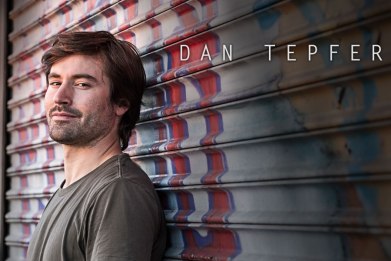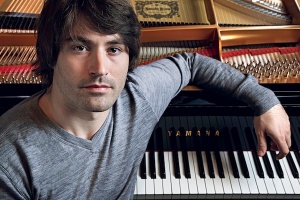
Dan Tepfer will be performing Goldberg Variations / Variations on October 4th, 8 pm, at the Doctorow Center for the Arts in Hunter, NY. After talking with Dan for the interview, I would describe him as worldly, ambitious and thought provoking. Now, I am looking forward to seeing him perform live to top the list off with being a sharply talented pianist-composer. Learn a little about Dan before his performance, Enjoy!
V: Now, I always envision a jazz performance being performed in front of me, or near me while I eat duck and enjoy a glass of wine. You do a lot of improvisational performances, where the audience is concentrating on you. Can you comment on feeding off of the energy with a crowd sitting there watching you, verses playing in front of a crowd that is enjoying dinner or dancing?
D: Absolutely, I believe it’s just like the difference between talking to somebody who’s not listening to you, which feels a little strange, and having an actual conversation with somebody. I feel that my performances are a real exchange with the audience. When I was in college I used to do background gigs in hotels and things like that and it’s a completely different exchange. When you’re doing that, you’re just fulfilling a purpose. It’s not really a particularly inspiring situation. But, if you’re in a nice hall with an audience that thinks you’re going to do something special, then that’s very inspiring. It’s a real exchange. I always felt it was a great opportunity to connect with people.
V: You grew up in Paris, and you go back to play there often. Now, taking away the general notion that in playing every show, the crowd is going to be different, the show is going to be different. How, in the cultural sense is playing in Paris a different experience than the United States?
D: Every country has their particularities. New York is a very different kind of crowd from the rest of the US in many ways because it’s very international. Also, when I play in NY a lot of young people tend to come out because a lot of young people are into jazz and improvisation. The French are really hardcore jazz fans. France was one of the first countries in the 30’s to really get into jazz outside of the US. I would say it’s really special playing in both places, it’s kind of subtle. I think the differences from the performance shows the biggest thing, because even in a different country or a different city you can have really different vibes from night to night. That’s what I find inspiring as an improviser, is to feed off of that difference.
V: Do you paint a different picture within each performance and if so, can you describe the picture you paint with the musical conversation in Goldberg’s Variations /Variations ?
D: Well, that’s a great question and I think there are a couple things happening. The structure generally, with the Goldberg Variations is very much, to me, like a tree. It starts from a single idea which I’m play at the beginning and then at the end, the aria. This is the little piece that everything else is a variation off. So that image is kind of like a tree, because you start off with this one trunk and it divides off into all these different branches that come from the trunk that are their own things. I would also say that one of the things that’s really special about the Goldberg Variations is that each one of the Variations has a strong identity. So each one, to me has it’s own imagery, and sometimes that imagery really changes from night to night. On any given night I will listen to how I feel, listen to how each Variation strikes me in the moment and then improvise off of that.
D: The Goldberg Variations as Bach wrote them have their very strong identity, very strong ideas and they are very carefully structured. When improvising off of each one of them it’s a combination taking those ideas and his structure and also taking into account how I’m feeling in the moment, how the piano feels, how the audience feels. All these different things are put together at the same time. You don’t think about it too much.
V: I’d like to talk about instability for a minute. On March 8, 2013 in the New York Times an articled titled “Sons of Opera Moms Go Far Afield”, you describe yourself as being amicable toward instability. Do you think that this is what attracted you to being a professional musician?
D: I think that’s part of it. Although, I also have friends who, musically, are always searching for stability, searching for areas that feel solid. Whereas I kind of have a tendency to go the other way. And these friends of mine who are searching for stability, might still enjoy the lifestyle of being a musician, which as you say is pretty unstable. I think, for me, it’s two separate things. I really enjoy the type of music and type of improvisation where you can always be searching for answers instead of finding the answers. Anytime you don’t know whether you’re going to find answers or not, it’s unstable. I think it’s an amazing situation to be in, to be allowed not have the answers, to be allowed to be asking questions all the time instead of finding more answers. It’s a luxury to be able to stay alive in the middle of the question instead of having to give answers.
V: Can you tell us about your triumphs in getting to where you are in the music world today?
D: Being a human being, being an artist, it’s all about the ups and downs and really riding those ups and downs. There’s a great poet, Rilke. He’s a really wonderful poet, but he also does a really lovely collection of letters he wrote to young poet called Letters To A Young Poet. It’s kind of his of this collection of his life to this young poet on what it means to be an artist and what it means to be human. One of things he said is that you really have to live your sadnesses. You can’t keep yourself from experiencing the sadnesses and expect yourself to be happy all the time. If you really do live your sadnesses, that’s where your future development comes from. I think it’s a constant cycle of ups and downs. I think that the key is to honor that and enjoy it rather than read into it. There’s no joy without sadness.
V: “It’s easy to play any musical instrument: all you have to do is touch the right key at the right time and the instrument will play itself.” -Bach.
I noticed you often close your eyes when you play the piano. Do you feel that you can relate to this quote?
D: I think that’s a wonderful quote, it’s one of my favorite quotes of Bach and one I like to use because it’s so… obviously, it’s not entirely true. I mean, it is entirely true at that one level. If you press the key at exactly the right time, than that’s going to be the right time and that’s the right music. That’s all there really is to it in a way. But, it’s so wonderfully innocent to present it that way because it’s so hard, a lot goes into playing. But at the same time it’s a reminder to keep it simple, keep what’s essential. It’s not something I really think about, I think the more you can just be in the music, and minimize outside distractions, than the more that kind of right time will present itself to you without you having to control it or force it.
V: Have you partaken in the ALS Ice Bucket challenge yet?
D: No, I haven’t actually. Nobody’s nominated me. I think it’s great. Any time you can find a kind of gimmick that gets people to talk about something like that, thats just great that’s what’s it’s about, right? I mean it’s not about the ice bucket. It’s about connecting to something that’s fun to do, something that’s important. It’s really smart the way they did that. Hopefully somebody will nominate me.
V: Have you visited the Catskills before?
D: I have. This concert’s organized by Piers Playfair and he invited me out there to see what kind of work the organization is doing. Actually, it came up on Valentine’s Day so I got to see the place then. I’ve also come up to the Catskills a couple of times. I really love to be in the mountains, go hiking.
V: What about zip-lining?
D: No, I haven’t done that, I would like to do that.
V: You’re coming up at a beautiful time, you should definitely check that out. Anything else you’d like to add?
D: I’m so grateful to get an opportunity to bring this music that’s really special to me to a place that’s a little more remote than I often play. Hopefully, I will connect with people up there. I think that Bach’s music has the potential to reach everybody, not just people who listen to classical music all the time.
V: We look forward to having you up here with the Catskill Mountain Foundation, It’s going to be an amazing performace. Thank you, Dan!!!
To Purchase tickets for Dan Tepher’s upcoming performance go here: http://www.catskillmtn.org/events/performances/2014-10-04-dan-tepfer-solo-jazz-piano-820.html

Reblogged this on I Write The Music.
LikeLike